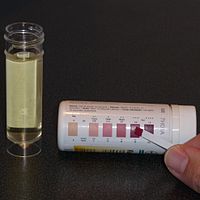
Photo from wikipedia
A traditional balanced Korean diet (K-diet) may improve energy, glucose, and lipid metabolism. To evaluate this, we conducted a randomized crossover clinical trial, involving participants aged 30–40 years, who were… Click to show full abstract
A traditional balanced Korean diet (K-diet) may improve energy, glucose, and lipid metabolism. To evaluate this, we conducted a randomized crossover clinical trial, involving participants aged 30–40 years, who were randomly assigned to two groups—a K-diet or westernized Korean control diet daily, with an estimated energy requirement (EER) of 1900 kcal. After a 4-week washout period, they switched the diet and followed it for 4 weeks. The carbohydrate, protein, and fat ratios based on energy intake were close to the target values for the K-diet (65:15:20) and control diet (60:15:25). The glycemic index of the control diet and the K-diet was 50.3 ± 3.6 and 68.1 ± 2.9, respectively, and daily cholesterol contents in the control diet and K-diet were 280 and 150 mg, respectively. Anthropometric and biochemical parameters involved in energy, glucose, and lipid metabolism were measured while plasma metabolites were determined using UPLC-QTOF-MS before and after the 4-week intervention. After the four-week intervention, both diets improved anthropometric and biochemical variables, but the K-diet significantly reduced them compared to the control diet. Serum total cholesterol, non-high-density lipoprotein cholesterol, and triglyceride concentrations were significantly lower in the K-diet group than in the control diet group. The waist circumference (p = 0.108) and insulin resistance index (QUICKI, p = 0.089) tended to be lower in the K-diet group than in the control diet group. Plasma metabolites indicated that participants in the K-diet group tended to reduce insulin resistance compared to those in the control diet group. Amino acids, especially branched-chain amino acids, tyrosine, tryptophan, and glutamate, and L-homocysteine concentrations were considerably lower in the K-diet group than in the control diet group (p < 0.05). Plasma glutathione concentrations, an index of antioxidant status, and 3-hydroxybutyric acid concentrations, were higher in the K-diet group than in the control diet group. In conclusion, a K-diet with adequate calories to meet EER alleviated dyslipidemia by decreasing insulin resistance-related amino acids and increasing ketones in the circulation of obese women.
Journal Title: Nutrients
Year Published: 2022
Link to full text (if available)
Share on Social Media: Sign Up to like & get
recommendations!